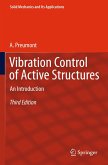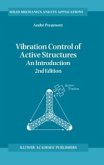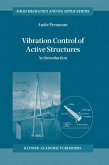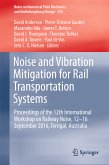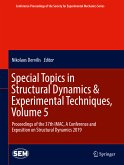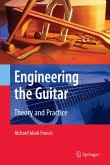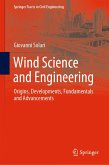

Alle Infos zum eBook verschenken

- Format: PDF
- Merkliste
- Auf die Merkliste
- Bewerten Bewerten
- Teilen
- Produkt teilen
- Produkterinnerung
- Produkterinnerung

Hier können Sie sich einloggen

Bitte loggen Sie sich zunächst in Ihr Kundenkonto ein oder registrieren Sie sich bei bücher.de, um das eBook-Abo tolino select nutzen zu können.
This textbook is an introduction to the dynamics of active structures and to the feedback control of lightly damped flexible structures; the emphasis is placed on basic issues and simple control strategies that work.
Now in its fourth edition, more chapters have been added, and comments and feedback from readers have been taken into account, while at the same time the unique premise of bridging the gap between structure and control has remained. Many examples, covering a broad field of applications from bridges to satellites and telescopes, and problems bring the subject to life and take…mehr
- Geräte: PC
- ohne Kopierschutz
- eBook Hilfe
- Größe: 24.71MB
![Vibration Control of Active Structures (eBook, PDF) Vibration Control of Active Structures (eBook, PDF)]() A. PreumontVibration Control of Active Structures (eBook, PDF)40,95 €
A. PreumontVibration Control of Active Structures (eBook, PDF)40,95 €![Vibration Control of Active Structures (eBook, PDF) Vibration Control of Active Structures (eBook, PDF)]() A. PreumontVibration Control of Active Structures (eBook, PDF)65,95 €
A. PreumontVibration Control of Active Structures (eBook, PDF)65,95 €![Vibration Control of Active Structures (eBook, PDF) Vibration Control of Active Structures (eBook, PDF)]() A. PreumontVibration Control of Active Structures (eBook, PDF)40,95 €
A. PreumontVibration Control of Active Structures (eBook, PDF)40,95 €![Noise and Vibration Mitigation for Rail Transportation Systems (eBook, PDF) Noise and Vibration Mitigation for Rail Transportation Systems (eBook, PDF)]() Noise and Vibration Mitigation for Rail Transportation Systems (eBook, PDF)161,95 €
Noise and Vibration Mitigation for Rail Transportation Systems (eBook, PDF)161,95 €![Special Topics in Structural Dynamics & Experimental Techniques, Volume 5 (eBook, PDF) Special Topics in Structural Dynamics & Experimental Techniques, Volume 5 (eBook, PDF)]() Special Topics in Structural Dynamics & Experimental Techniques, Volume 5 (eBook, PDF)113,95 €
Special Topics in Structural Dynamics & Experimental Techniques, Volume 5 (eBook, PDF)113,95 €![Engineering the Guitar (eBook, PDF) Engineering the Guitar (eBook, PDF)]() Richard Mark FrenchEngineering the Guitar (eBook, PDF)48,95 €
Richard Mark FrenchEngineering the Guitar (eBook, PDF)48,95 €![Wind Science and Engineering (eBook, PDF) Wind Science and Engineering (eBook, PDF)]() Giovanni SolariWind Science and Engineering (eBook, PDF)169,95 €
Giovanni SolariWind Science and Engineering (eBook, PDF)169,95 €- -39%11
-
-
Now in its fourth edition, more chapters have been added, and comments and feedback from readers have been taken into account, while at the same time the unique premise of bridging the gap between structure and control has remained. Many examples, covering a broad field of applications from bridges to satellites and telescopes, and problems bring the subject to life and take the audience from theory to practice.
The book has 19 chapters dealing with some concepts in structural dynamics; electromagnetic and piezoelectric transducers; piezoelectric beam, plate and truss; passive damping with piezoelectric transducers; collocated versus non-collocated control; active damping with collocated systems; vibration isolation; state space approach; analysis and synthesis in the frequency domain; optimal control; controllability and observability; stability; applications; tendon control of cable structures; active control of deformable mirrors for Adaptive Optics and large earth-based and space telescopes; and semi-active control. The book concludes with an exhaustive bibliography and index.
This book is intended for structural engineers who want to acquire some background in vibration control, and for control engineers who are dealing with flexible structures. It can be used as a textbook for a graduate course on vibration control or active structures.
A solutions manual is available through the publisher to teachers using this book as a textbook.
Dieser Download kann aus rechtlichen Gründen nur mit Rechnungsadresse in A, B, BG, CY, CZ, D, DK, EW, E, FIN, F, GR, HR, H, IRL, I, LT, L, LR, M, NL, PL, P, R, S, SLO, SK ausgeliefert werden.
- Produktdetails
- Verlag: Springer International Publishing
- Seitenzahl: 518
- Erscheinungstermin: 10. Februar 2018
- Englisch
- ISBN-13: 9783319722962
- Artikelnr.: 53679810
- Verlag: Springer International Publishing
- Seitenzahl: 518
- Erscheinungstermin: 10. Februar 2018
- Englisch
- ISBN-13: 9783319722962
- Artikelnr.: 53679810
- Herstellerkennzeichnung Die Herstellerinformationen sind derzeit nicht verfügbar.

